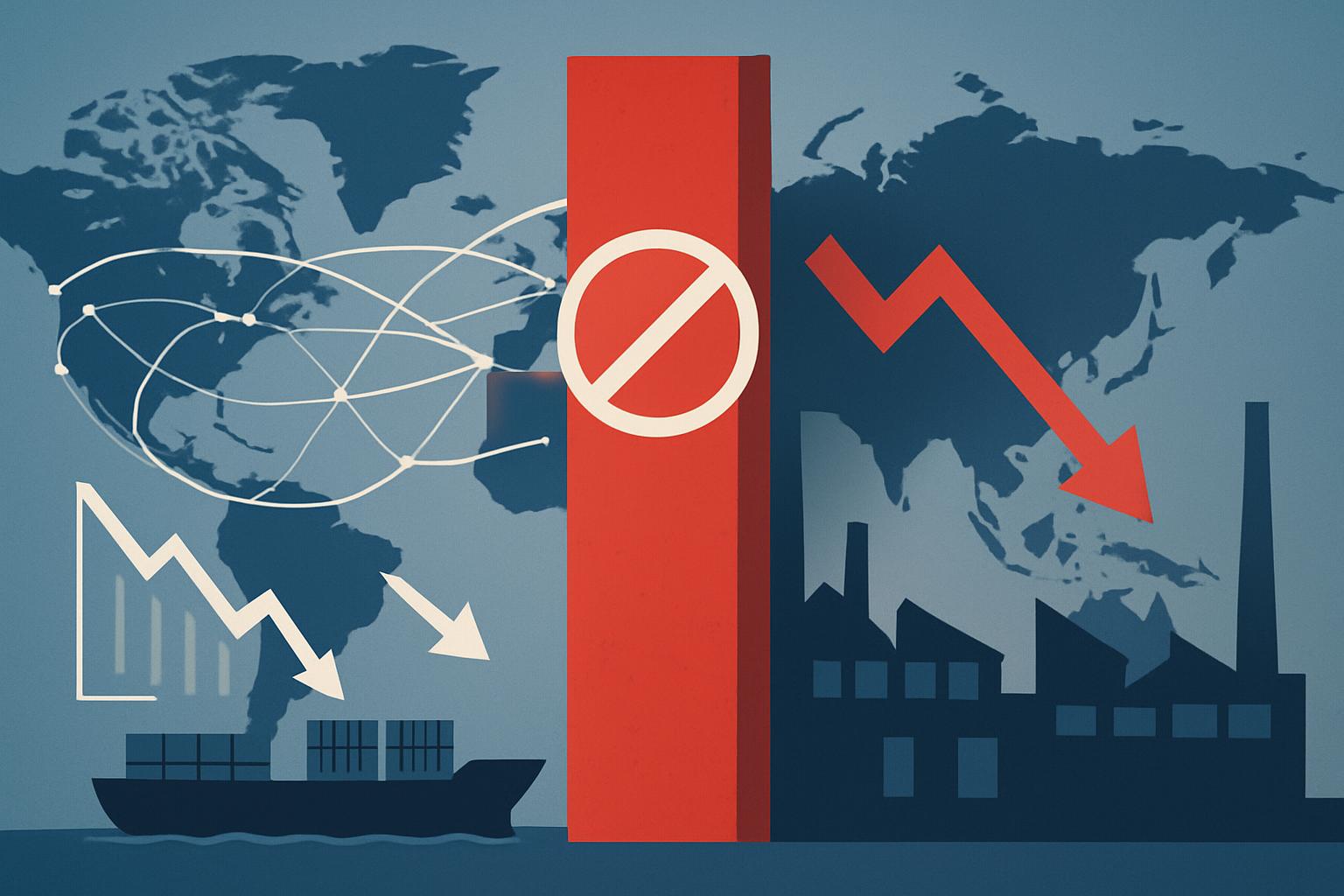In international trade, companies can face various forms of sanctions, the most severe of which is a total embargo. This comprehensive measure has a profound impact on foreign trade. Companies involved in foreign trade should understand the prohibitions and restrictions in order to minimize risks and ensure compliance. In this article, we discuss the significance and consequences of total embargoes and explain what companies need to bear in mind.
What is a total embargo?
Short definition
A total embargo is one of the most severe forms of sanctions, completely severing all economic ties with a particular country. This affects the import and export of goods, services, financial transactions, the conclusion of contracts, and the provision of economic resources. It therefore encompasses all types of economic and financial sanctions.
A total embargo can only be imposed in exceptional cases, such as in response to serious human rights violations or the development of weapons of mass destruction.
Difference between total embargo and partial embargo
The main difference between a total embargo and a partial embargo lies in the scope of the sanctions:
- Total embargo: Prohibition of all economic relations, with a few exceptions (e.g., goods for humanitarian aid)
- Partial embargo: Restrictions and bans only apply to certain sectors or products (e.g., arms embargo: weapons, ammunition, military equipment, etc. on the BAFA export list in Part I Section A of the Foreign Trade and Payments Ordinance)
Total embargoes are therefore more far-reaching and affect all economic transactions.
Why are embargoes imposed?
Embargo measures are usually imposed for political and economic reasons. Extensive total embargoes in particular are usually a response to serious international conflicts or human rights violations. Possible objectives are:
- Political objectives: To force changes in the behavior of the country concerned, such as ending wars or complying with human rights standards
- Economic objectives: Weakening a country’s economy by denying it access to international markets and resources
Embargo regulations often also serve as a strong signal from the international community (e.g., the United Nations) that certain actions will not be tolerated.
Effects of a total embargo on foreign trade
Economic consequences for affected countries
Country-specific embargo measures in the form of a total embargo can have dramatic effects on the economy of the affected country. The most important consequences are:
- Drastic decline in trade: Import and export transactions can decline dramatically as a result of the restrictive measures
- Economic collapse: Industries can collapse due to a lack of materials and spare parts
- Currency depreciation and inflation: The lack of international trade relations leads to a decline in national income and an increase in inflation
Why total embargoes sometimes don’t work
Although restrictions imposed as part of a total embargo are intended to have a strong impact, they can be ineffective for a number of reasons:
- Circumvention by third countries: Sanctioned goods reach the affected country via detours
- Incomplete international participation: Not all countries support the decision to impose a total embargo on a country, which weakens its effectiveness
- Black markets: The emergence of illegal markets can weaken the pressure on the affected country
Consequences for companies involved in international trade
Impact on trade relations and compliance
A total embargo poses a serious challenge for companies involved in international trade. The effects include:
- Termination of all business relationships: Companies are not allowed to conduct any transactions with the affected country
- Prohibitions on contract fulfillment: Even contracts that have already been concluded can no longer be fulfilled
- Compliance risks: Companies must regularly check sanctions lists and adapt their processes to legal requirements
Strategies for minimizing risks
Companies should develop strategies to minimize risks associated with total embargoes. This includes, on the one hand, ongoing awareness-raising and training of employees on current sanctions regulations. On the other hand, a structured compliance system should be established. The following aspects are important, among others:
- Automatic sanctions list screenings for business contacts and, if necessary, employees
- Know Your Customer processes
To implement this in practice, special software solutions are needed that check in real time and securely document all processes—such as SANSCREEN.
Legal security for your company - with SANSCREEN
With SANSCREEN, you can play it safe. Check your business contacts manually or automatically against daily sanctions lists. With detailed and audit-proof logs, you can provide complete proof of your compliance measures if required.
Examples of total embargoes
Are there currently any total embargoes imposed by the EU?
No, there is currently no total embargo imposed by the EU. Most international sanctions are limited to partial embargoes. For example, the European Union has imposed sanctions against Russia, Iran, and North Korea as part of its common foreign and security policy. These sanctions affect wide-ranging economic sectors such as energy, finance, and technology, severely restricting the countries concerned.
What are some (historical) examples of total embargoes?
Historically, there are several notable examples of total embargoes:
- Iraq (1990–2003): The most comprehensive total embargo in modern history, imposed by the United Nations Security Council after the invasion of Kuwait. This led to a dramatic economic collapse and a 90% loss of the country’s exports.
- Cuba (since 1962): A long-standing total embargo by the US, which has been repeatedly tightened and relaxed over the decades. Currently (as of July 2025), it is only a partial embargo by definition, but the embargo regulations are very comprehensive. They were last extended (June 30, 2025) under US President Trump.
View current embargo measures and other sanctions
It is crucial for companies to keep themselves regularly informed about current sanctions measures. Official sources such as the EU Sanctions Map or the BAFA provide up-to-date information on embargoes that have been imposed. Companies can always view the latest information on these platforms to ensure that they comply with all compliance requirements.
Conclusion: major restrictions on international trade
A total embargo is the most severe instrument of international sanctions and has far-reaching consequences for the affected country and for companies engaged in international trade. It is crucial that companies establish effective compliance management to minimize risks and avoid sanctions. Only by proactively addressing existing sanctions can companies ensure that they remain successful in international business.




